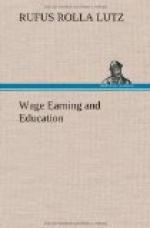Violation of the strict rules laid down for the operation of trains on the part of employees may result in reprimand, suspension, or dismissal, according to the gravity of the offense. The penalty of suspension has practically superseded the others except in extreme cases, such as drunkenness, theft, or other serious violations of the rules, for which offenders are summarily dismissed. On some railroads, a graded system of demerits is used. When an employee has received a certain number of demerits he is dismissed from the service.
The railroad unions are among the strongest and most aggressive in the country. The total union membership among train operating employees alone in the country is approximately 350,000. The unions are all modeled upon the same general plan. They are quite independent of each other, keep strictly to their agreements and oppose the sympathetic strike. They all maintain some form of life insurance. Four organizations have underwritten over $500,000,000 of insurance and one of them in a single year paid claims amounting to $1,135,000. The influence of these unions has been particularly effective in securing the passage of protective state and national legislation such as full crew laws, standardization of train equipment, employers’ liability laws, car limit laws, etc.
The hazardous nature of the work is indicated by a statement made by a prominent union official to the effect that the Trainmen’s Brotherhood paid a claim for death or disability every seven hours. A report to the Interstate Commerce Commission states that there is one case of injury in train or yard service every nine minutes. With the invention of safety devices the risk of accident has been greatly lessened, but railroading is still one of the most dangerous industrial occupations.
There is little chance of employment for applicants under the age of 21 years. In fact, many roads refuse to employ men below this age. Physical or sense defects which often accompany advancing years, and which would not disqualify a man in other occupations do so in railroad work. The average length of the working life is a little over 12 years.
Railroad employees are among the best paid workers in the country. A close estimate based on extensive wage investigations places the annual earnings of engineers at from $1,200 to $2,400 a year, with an average of $1,600. Conductors average about $1,350, firemen a little over $900, and other trainmen about $950. The usual working day is 10 hours, although this is often exceeded. Overtime is paid on a regular scale agreed upon by the companies and the union.




